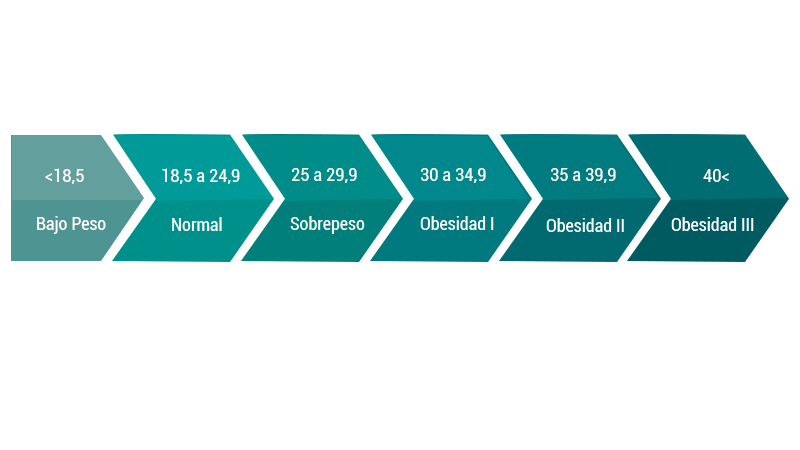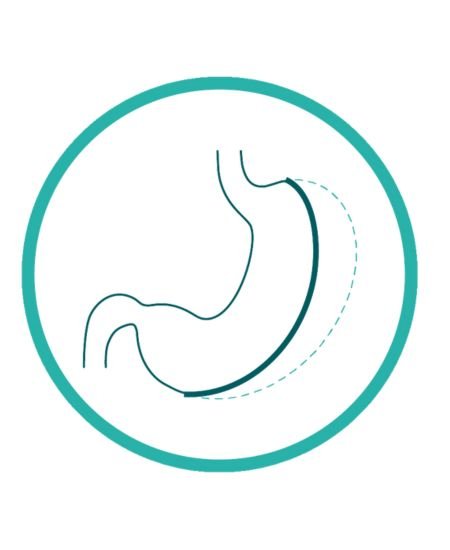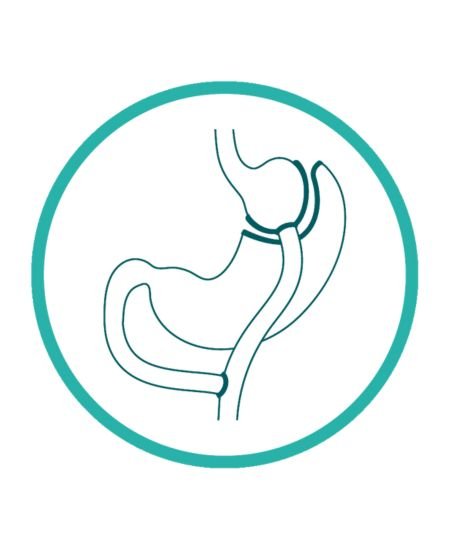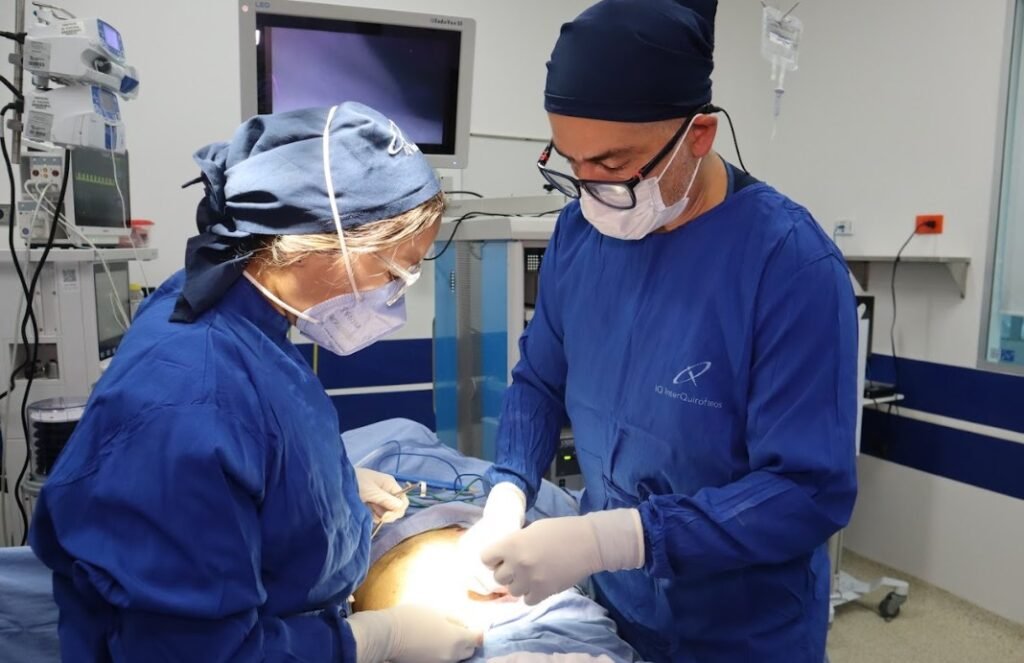Are you fighting with obesity and not winning with regular methods like dieting or exercising? If so, bariatric surgery might be what you need. When thinking about weight loss surgery, two choices usually come up: Roux en Y gastric bypass and gastric sleeve surgery. These both help you lose weight by making your stomach smaller, but they work in different ways and have their own benefits and risks.
Deciding if you should go with Roux en Y gastric bypass or a gastric sleeve is very personal. You have to think about your BMI, how severe your health problems from obesity are, and what you want. Getting the right surgery depends on your unique needs. It’s important to learn all you can and get advice from experts in dealing with obesity.
Here, we’re going to learn more about Roux en Y gastric bypass and gastric sleeve surgery. We’ll look at what each surgery does, how it affects your health, portion sizes, what nutrients you need, and if you can keep the weight off long term. We’ll also talk about how important it is to change your lifestyle after surgery. Plus, we’ll introduce you to Dr. Santiago Gómez Correa, who is great at bariatric surgery and speaks both English and Spanish. He works in Medellín – Colombia and offers top-notch bariatric surgery care.
By the time you finish reading, you’ll know the main differences between Roux en Y gastric bypass and gastric sleeve surgeries. This knowledge will help you choose the best weight loss surgery for a healthier life.
Weight Loss Surgery Key Takeaways:
- Roux en Y gastric bypass and gastric sleeve surgery are two popular bariatric surgery options for individuals with obesity who have been unable to lose weight through conventional methods.
- The choice between Roux en Y gastric bypass and gastric sleeve surgery depends on factors such as BMI, severity of comorbidities, and personal preferences.
- Both procedures aim to facilitate weight loss by reducing stomach size, but they differ in approach and potential benefits and risks.
- Post-surgery lifestyle changes are crucial for long-term weight management success.
- Dr. Santiago Gómez Correa is a certified bariatric surgeon offering exceptional bariatric surgery services in Colombia.
Understanding Bariatric Surgery
For people fighting morbid obesity, bariatric surgery is a popular and effective option. It helps in losing a lot of weight and improving your health. After trying diets and exercises without success, bariatric surgery provides a new hope. It allows patients to take charge again and lowers health risks linked to obesity.
Bariatric Surgery in Colombia.
When considering bariatric surgery, Colombia has emerged as an excellent option for patients seeking high-quality care at a more affordable price. Colombia, particularly the city of Medellín, is home to world-class bariatric surgeons like Dr. Santiago Gómez Correa, who offer personalized treatment plans and state-of-the-art facilities.
Medical tourism in Colombia allows patients to receive top-notch care while enjoying cost savings compared to prices in the United States or Europe. Additionally, the warm climate and beautiful surroundings of Colombia provide a relaxing environment for post-surgery recovery, making it an attractive destination for those looking to combine their weight loss journey with a rejuvenating experience abroad.


What is Bariatric Surgery?
Bariatric surgery is a procedure to aid very overweight people in losing weight. It changes the digestive system to reduce how much a person can eat or absorb. Such surgeries help in losing weight and can make diseases like diabetes or sleep apnea better or go away.
Eligibility Criteria for Bariatric Surgery, Not everyone can get bariatric surgery, Why?
Not everyone can get bariatric surgery, even if they are very overweight. There are rules to follow. For example, your BMI must show severe obesity or less severe obesity plus a health issue linked to obesity. Before the surgery, you must also have tried to lose weight through diet and exercise with help for at least two years.
Many of my patients come into my office saying, «Dr Santiago, I want you to give me a gastric sleeve,» but it’s not that simple. Each patient must meet minimum requirements before being considered for bariatric surgery. It’s crucial to understand that this procedure is not a quick fix, but rather a tool to aid in long-term weight loss and improved health.
After meeting the requirements, you should be prepared to make some lifestyle changes. The surgeon will evaluate you and provide guidance on what your new way of eating will look like. This ensures that the surgery is the right choice and that you are prepared for everything it entails.
«We want to make sure our patients are not only physically prepared for surgery but also mentally and emotionally ready to commit to the necessary changes in their eating habits and lifestyle to achieve lasting success,» says Dr. Santiago Gomez Correa, Bariatric Surgeon.«We want to make sure our patients are not only physically prepared for surgery but also mentally and emotionally ready to commit to the necessary changes in their eating habits and lifestyle to achieve lasting success,» says Dr. Santiago Gomez Correa, Bariatric Surgeon.
The Role of BMI in Bariatric Surgery Eligibility
Body Mass Index (BMI) is a crucial factor in determining a patient’s eligibility for bariatric surgery. BMI is a measure of body fat based on an individual’s weight and height, and it helps classify obesity levels. To calculate BMI, divide a person’s weight in kilograms by their height in meters squared (kg/m²).
BMI calculator
| BMI Range | Classification | Eligibility for Bariatric Surgery |
|---|---|---|
| 18.5 - 24.9 | Normal weight | Not eligible |
| 25.0 - 29.9 | Overweight | Not eligible |
| 30.0 - 34.9 | Class I Obesity | elegible |
| 35.0 - 39.9 | Class II Obesity | Eligible with at least one obesity-related comorbidity |
| 40.0 and above | Class III Obesity (Morbid Obesity) | Eligible |
In general, a BMI of 30 or above indicates obesity, while a BMI of 40 or higher (or 35 and up with obesity-related health issues) is considered severe obesity. Patients with Obesity grade I or severe obesity are typically eligible for bariatric surgery, as they have a higher risk of developing serious health problems and may struggle to achieve significant weight loss through conventional methods like diet and exercise alone.
However, BMI is not the sole determinant of bariatric surgery eligibility. Other factors, such as the presence of obesity-related health conditions (e.g., type 2 diabetes, high blood pressure, sleep apnea), age, and overall health status, also play a role in the decision-making process. A comprehensive evaluation by a certified bariatric surgeon is necessary to assess a patient’s suitability for surgery and to develop a personalized treatment plan.
It’s important to note that while BMI is a useful screening tool, it does have limitations. BMI does not distinguish between muscle mass and body fat, nor does it account for fat distribution. Therefore, additional assessments, such as body composition analysis and waist circumference measurements, may be used in conjunction with BMI to gain a more complete understanding of a patient’s obesity-related health risks.
calculate your BMI

Methods of Bariatric Surgery: Restrictive and Malabsorptive Procedures
According to Dr. Santiago Gómez Correa, a renowned bariatric surgeon based in Medellín, Colombia, the method applied in bariatric surgery depends on the specific type of procedure being performed. The two main categories of bariatric surgery methods are restrictive and malabsorptive.
Restrictive Method: Gastric Sleeve Surgery

Gastric sleeve surgery, also known as sleeve gastrectomy, is a restrictive method of bariatric surgery. This procedure removes a significant portion of the stomach, leaving behind a narrow, banana-shaped «sleeve.» Reducing the size of the stomach limits the amount of food one can consume in one sitting, resulting in a feeling of fullness with smaller portions. This restrictive method helps patients lose weight by decreasing their caloric intake.
The hormonal changes associated with gastric sleeve surgery also contribute to weight loss. The portion of the stomach removed during the procedure contains cells that produce ghrelin, the «hunger hormone.» By eliminating these cells, appetite is reduced, further aiding in weight loss efforts.

Gastric Bypass Surgery: A Restrictive and Malabsorptive Method.

Gastric bypass surgery, specifically the Roux-en-Y gastric bypass, is a combination of restrictive and malabsorptive methods. This procedure involves creating a small pouch at the top of the stomach and connecting it directly to the small intestine, bypassing the rest of the stomach and the upper part of the small intestine (duodenum).
Gastric bypass surgery shares a restrictive component with gastric sleeve surgery, as the small pouch restricts the amount of food consumed. However, the malabsorptive aspect of the procedure further enhances weight loss by reducing the absorption of nutrients and calories in the small intestine. By bypassing a portion of the small intestine, the body absorbs fewer calories from the food consumed.
As a bariatric surgeon, I frequently emphasize that the combination of restrictive and malabsorptive methods in gastric bypass surgery often leads to more significant and rapid weight loss than purely restrictive procedures like gastric sleeve surgery. However, I also note that the malabsorptive component of gastric bypass surgery may increase the risk of nutritional deficiencies, requiring patients to adhere to a strict supplementation regimen and follow-up with their bariatric team.
Roux en Y Gastric Bypass: The Procedure
Roux en Y gastric bypass is a powerful surgery for weight loss. It mixes two methods. One is making the stomach smaller to eat less. The other cuts how much nutrient the body takes in. This surgery helps reduce weight and improve obesity-related health issues.
How Roux en Y Gastric Bypass Works
This surgery creates a tiny stomach pouch the size of an egg. We staple off the upper part of the stomach to form this pouch. The small intestine is then split.
The new stomach connects to the bottom part. This bypasses a significant portion of the stomach and the beginning of the small intestine. As a result, the body absorbs fewer nutrients and calories, aiding in weight loss.
Advantages of Roux en Y Gastric Bypass
| Advantage | Description |
|---|---|
| Greater weight loss | Patients often lose up to 70% of excess body weight within the first year |
| Improvement incomorbidities | Type 2 diabetes, hypertension, and other obesity-related conditions may improve or resolve |
| Betterlong-term weight loss maintenance | Combination of restrictive and malabsorptive mechanisms contributes to sustained weight loss |
Roux en Y gastric bypass can lead to more weight loss than other surgeries. In the first year, patients often shed up to 70% of extra body weight. This procedure can also quickly improve or cure problems like type 2 diabetes.
Its mix of reducing food intake and fewer nutrients also helps people maintain weight loss better over time.
Disadvantages of Roux en Y Gastric Bypass
| Disadvantage | Description |
|---|---|
| Lifelong vitamin and mineral supplementation | Malabsorption necessitates daily supplementation to prevent nutritional deficiencies |
| NSAID avoidance | Non-steroidal anti-inflammatory drugs can increase the risk of marginal ulcers and anastomotic complications |
| Internal hernia risk | Intestines may become trapped in pockets created during the rerouting process, requiring surgical intervention |
But there are downsides to Roux en Y. A big one is the need for taking vitamins and minerals for life. This is because the body won’t absorb them well anymore. Common deficiencies are in iron, calcium, and certain vitamins.
Gastric Sleeve: The Procedure
Another name for gastric sleeve surgery is sleeve gastrectomy. It’s a type of restrictive bariatric surgery. It involves taking out a large part of the stomach. This surgery has become popular for its success in helping people lose weight. It also has a quicker recovery time when compared to other bariatric surgeries.
How Gastric Sleeve Surgery Works
The surgeon takes out about 80% of the stomach during the gastric sleeve procedure. This leaves a banana-shaped stomach pouch. Having a smaller stomach makes patients feel full faster. This is because they can’t eat as much. The surgery also causes hormonal changes. These changes help reduce hunger and aid in losing weight.
Gastric Sleeve Surgery's Advantages
One main advantage is how much weight people can lose. After surgery, people shed about 60–70% of their extra weight in the first year. This occurs because the surgery reduces stomach size and alters hormone function. This leads to strong support for losing weight.
After this surgery, getting back to normal is quicker than with other types of weight-loss surgery. Most people resume their normal activities within 2–4 weeks. This quick recovery lets people start their new life sooner. They can adopt healthier habits faster.
Disadvantages of Gastric Sleeve Surgery
There are some downsides to consider. One is that acid reflux could get worse or start after surgery. This happens because of the changes in the stomach. Managing this might require lifelong medication or even more surgeries.
Like any surgery, there are general risks to think about. These include the chance of bleeding, infection, or not reacting well to the anesthesia. But when the surgery is done by a skilled bariatric surgeon in a good facility, these risks are usually very low.
Improvement in Obesity-Related Comorbidities
Bariatric surgery, like Roux en Y gastric bypass and gastric sleeve, greatly helps with obesity-related issues. These surgeries aid in losing weight and improving health. This means a better life for patients.
One of the greatest moments of satisfaction I experience is when my patients tell me that thanks to bariatric surgery, they thank me because, besides losing weight, their health has improved. These success stories motivate me to continue working for the health and wellbeing of everyone.
Bariatric surgery, like Roux en Y gastric bypass and gastric sleeve, greatly helps with obesity-related issues. These surgeries aid in losing weight and improving health. This means a better life for my patients. Several diseases improve with bariatric surgery:
Type 2 Diabetes
Bariatric surgery can put type 2 diabetes into remission. The Roux en Y gastric bypass surgery is very effective. Even before significant weight loss, it helps with diabetes.
The surgery changes hormones, improving how the body uses insulin and glucose.
Hypertension
Obesity often leads to high blood pressure. Both bypass and sleeve surgeries reduce the risk. As patients lose weight, their hearts and blood vessels need to work less hard.
This helps lower blood pressure. Many people can stop taking high blood pressure pills after surgery.
Sleep Apnea
Obesity can cause sleep apnea, which occurs when breathing stops and starts during sleep. Bariatric surgery can improve this condition. It eases the pressure on the breathing airway.
After surgery, many patients sleep better and feel less fatigued during the day. Some might not need CPAP therapy anymore.
What is CPAP?
According to National Hear, Jung, and blood Institute (https://www.nhlbi.nih.gov/) CPAP (continuous positive airway pressure) is a machine that uses mild air pressure to keep breathing airways open while you sleep. Your healthcare provider may prescribe CPAP to treat sleep-related breathing disorders including sleep apnea. CPAP also may treat preterm infants who have underdeveloped lungs.
Gastroesophageal Reflux Disease (GERD)
The impact of bariatric surgery on GERD varies depending on the type of surgery. The Roux en Y bypass can often stop GERD symptoms by reducing acid. But take in mind the gastric sleeve might make GERD worse.
Surgery choice should consider existing GERD. It is vital to look at which surgery may be best for each patient’s situation.
Quality of Life after Bariatric Surgery

Getting bariatric surgery, like the Roux en Y gastric bypass or gastric sleeve, can change a patient’s life for the better. It helps people with severe obesity get healthier. They start to move easier, have more energy, and feel better overall.
The surgery doesn’t just make people physically better. Their minds become healthier, they feel better about themselves, and their friendships grow stronger. After losing weight, they are more outgoing and enjoy new things.
Many patients express a newfound sense of freedom and joy in their daily lives after successful bariatric surgery. They feel more capable, energetic, and optimistic about the future.
Scientists have looked into how bariatric surgery changes the quality of people’s lives. They used tools like the GIQLI and BAROS.
Case Study 1: The Bariatric Quality of Life index: a measure of well-being in obesity surgery patients. Clik Here: https://pubmed.ncbi.nlm.nih.gov/15954234/
Case Study 2: Validation of the adapted Bariatric Quality of Life Index (BQL) in a prospective study in 446 bariatric patients as one-factor model Click Here: https://pubmed.ncbi.nlm.nih.gov/20124782/
| Domain | Improvements |
|---|---|
| Physical Function | Increased mobility, reduced pain, improved sleep quality |
| Mental Health | Reduced depression and anxiety, enhanced self-esteem, greater life satisfaction |
| Social Relationships | Improved social interactions, increased participation in activities, better interpersonal relationships |




